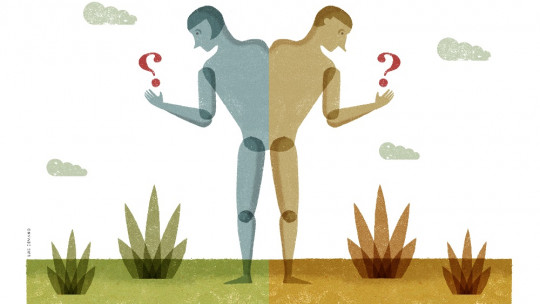
In Western societies, the stagnation of feeling in an existential crisis is very common. “I don’t know what to do with my life” is a thought that appears frequently in psychotherapy consultations and that goes hand in hand with a discomfort that is difficult to describe.
Not knowing how to guide one’s professional career gives rise to many other types of doubts, and this uncertainty accumulates until it is difficult to bear.
In this article we will see a series of tips about how to focus on a life project and develop it as a long-term project to provide us with stability, both in relation to the private and personal sphere and in our professional aspect.
I don’t know what to do with my professional life: how to solve it?
Life doesn’t come with an instruction manual. If we add to that the fact that The work environment is changing and it is difficult to maintain a professional career that always remains the same, it is common for people not to know very well what to dedicate their time to. The same can be said about stability in private life, which is largely related to what we do to support ourselves financially.
Now, the fact that it is relatively normal to encounter people who do not know what to do with their lives does not mean that this problem has no solution, or that it should be normalized, as if feeling the weight of that unknown were natural, expected. Let’s see, then, what are the different facets of this psychological phenomenon and what we can do to solve it. Firstly, we will see the keys necessary to create a life project to dedicate our work time, and finally we will give the keys to reorient our lives beyond professions and trades.
1. Analyze your material conditions
This first step is essential to begin to propose a life project that has the potential to provide us with a minimum of stability over the years.
Being aware of our material and economic limitations helps us lay a solid foundation for our professional projects, given that in practically any option that occurs to us there is an objective expense, on the one hand, and an opportunity cost, on the other. . The latter has to do with the opportunities we miss due to being focused on a certain objective.
By the way, in this step we must also take into account the time we have available. This is something that we often overlook and that can lead us to spend a lot of resources starting a path to which we cannot dedicate enough hours a week.
2. Write down loose ideas
Those who think to themselves “I don’t know what to do with my life,” in part, face a creative problem. Finding the most valuable ideas requires thinking about it, knowing new realities and, above all, commit to experimenting with these first sketches of what our lives could be in the future.
Therefore, in this phase we will give a creative response to the problem. To do this, the important thing is not to let us forget anything, so it is necessary to always carry a small notebook with you to write down ideas as they arise.
3. Make a list of values
In this phase, you should make a small list of the values to which you give the most importance: write down about 5 or 6 concepts and order them according to their priority.
4. Rule out possible professional projects
In this phase, you should discard approximately two-thirds of the elements on the list of ideas, taking into account the degree of excitement they produce in you and the degree to which you believe they conflict with your values.
Besides, You must also base yourself on realistic criteria whether you have the means and the time necessary to make you prosper in them.
When it comes to the concept of “thriving,” consider what your expectations are in each case. This way you will have an approximate idea of your degree of affinity with each project; If in one you need to obtain exceptional results to feel that it has been worth it, you will surely not be as excited as another option in which that feeling comes with much more discreet results.
5. Analyze your capabilities
In this phase in which you have few options left to choose from, consider your personal skills, those that are linked to your way of being and thinking.
With enough effort and work, you could surely manage to perform well at practically any task (unless you have significant health problems), as long as your objective is not to be among the elite of the sector at a very broad territorial level. But despite this, it is not realistic to assume that you will be training day and night in order to thrive.
Therefore, make a table with your weaknesses and strengths, and think about how those characteristics fit with the projects you have considered. You don’t have to decide on the one that fits perfectly with your way of being if there is another option that you like more, but it will help you decide and think about the effort you will have to dedicate to it.
6. Make up your mind and start as soon as possible
It is important that the time that passes between making the final decision and starting to put it into practice is as short as possible. The beginnings are always complicated, but once you have started, it doesn’t cost that much anymore. Don’t self-sabotage!
How to guide your personal life towards an exciting goal
In this final section we will see tips and ideas for those who do not know what to do with their personal life. Whether it is the case of a person without a job or someone who does not have financial or work problems but does not know what to do in their free time, there are a series of guidelines to follow. Let’s see them.
1. Find material support
Finding economic and material stability that reaches a minimum is essential to develop exciting life projects; If not, uncertainty will gradually erode our confidence in the idea that everything is worth it, given that In a matter of a few days everything can change (and it is likely that this change for the worse will occur if there is no economic cushion or external help). Therefore, we must try to find a balance between the work invested in gaining autonomy and having free time.
2. Focus on a few goals
Look for goals to achieve and focus on one or two, but not more. This way you can commit to them, give them the time they deserve.
When looking for and selecting ideas, base yourself on the steps to follow that we saw in the previous section about finding ideas to develop a professional career, but this time don’t limit yourself to work.
3. Make friends and strengthen emotional ties
Progress in personal development tastes best if it is shared by others. Therefore, do not forget about others, do not break contact with them in order to dedicate effort to your projects, and make new contacts. The latter is also interesting to have access to new ideas, new environments with creative potential, etc.
4. Don’t be obsessed with being original
The pretense of wanting to do something unique will only enslave you. Worry about doing something that fulfills you, not about creating something innovative, since nothing exists in isolation from what has already been created before.








